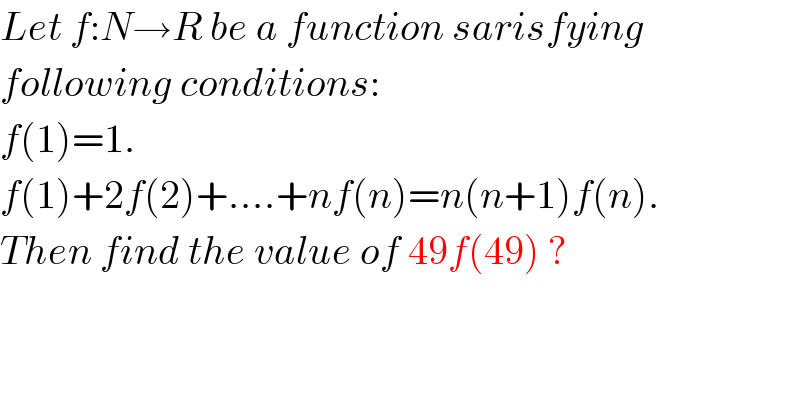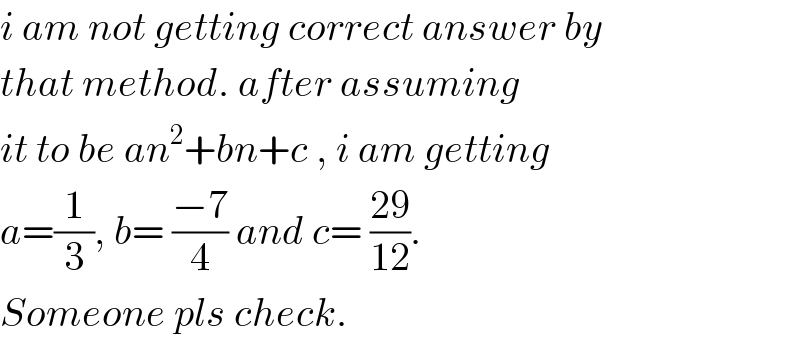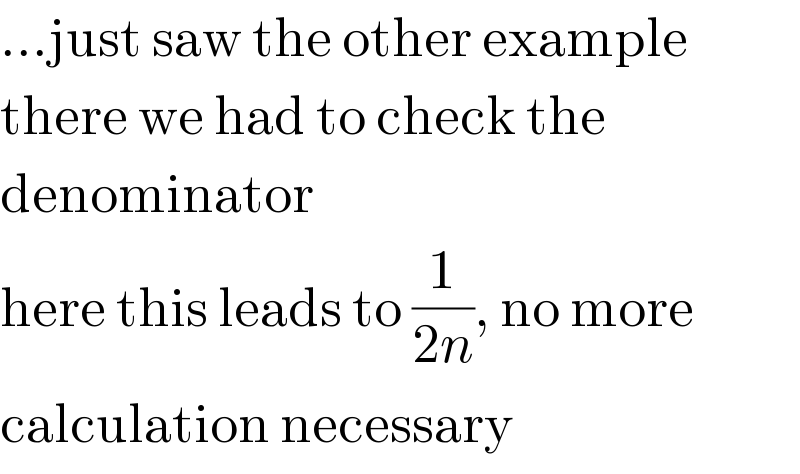Question Number 33048 by rahul 19 last updated on 09/Apr/18

$${Let}\:{f}:{N}\rightarrow{R}\:{be}\:{a}\:{function}\:{sarisfying} \\ $$$${following}\:{conditions}: \\ $$$${f}\left(\mathrm{1}\right)=\mathrm{1}. \\ $$$${f}\left(\mathrm{1}\right)+\mathrm{2}{f}\left(\mathrm{2}\right)+….+{nf}\left({n}\right)={n}\left({n}+\mathrm{1}\right){f}\left({n}\right). \\ $$$${Then}\:{find}\:{the}\:{value}\:{of}\:\mathrm{49}{f}\left(\mathrm{49}\right)\:? \\ $$
Commented by rahul 19 last updated on 09/Apr/18

$${well},\:{i}\:{could}\:{find}\:{out}\:{the}\:{pattern}\:{easily} \\ $$$${this}\:{time}\:{which}\:{is}\:\frac{\mathrm{1}}{\mathrm{2}{n}}. \\ $$$${But}\:{how}\:{to}\:{do}\:{by}\:{finding}\:{general}\:{term}? \\ $$
Commented by rahul 19 last updated on 09/Apr/18

$${i}\:{am}\:{not}\:{getting}\:{correct}\:{answer}\:{by} \\ $$$${that}\:{method}.\:{after}\:{assuming}\: \\ $$$${it}\:{to}\:{be}\:{an}^{\mathrm{2}} +{bn}+{c}\:,\:{i}\:{am}\:{getting} \\ $$$${a}=\frac{\mathrm{1}}{\mathrm{3}},\:{b}=\:\frac{−\mathrm{7}}{\mathrm{4}}\:{and}\:{c}=\:\frac{\mathrm{29}}{\mathrm{12}}. \\ $$$${Someone}\:{pls}\:{check}. \\ $$
Commented by MJS last updated on 09/Apr/18
![...you already found it. the polynomial method doesn′t work with patterns like this, when you already have a formular for all n∈N i.e. if we know a_0 =1; a_1 =1; a_2 =2; a_3 =6; a_4 =24 we believe it′s n! but we can find ∞ functions satisfying these pairs (n;a_n ), one is a 4^(th) −degree polynomial if we know a_0 =1; a_n =n×a_(n−1) we know it′s n!, and there′s no polynome for it [if you find one, you′ll get the Nobel Price ;−)]](https://www.tinkutara.com/question/Q33058.png)
$$…\mathrm{you}\:\mathrm{already}\:\mathrm{found}\:\mathrm{it}. \\ $$$$\mathrm{the}\:\mathrm{polynomial}\:\mathrm{method}\:\mathrm{doesn}'\mathrm{t} \\ $$$$\mathrm{work}\:\mathrm{with}\:\mathrm{patterns}\:\mathrm{like}\:\mathrm{this}, \\ $$$$\mathrm{when}\:\mathrm{you}\:\mathrm{already}\:\mathrm{have}\:\mathrm{a}\:\mathrm{formular} \\ $$$$\mathrm{for}\:\mathrm{all}\:{n}\in\mathbb{N} \\ $$$$\mathrm{i}.\mathrm{e}. \\ $$$$\mathrm{if}\:\mathrm{we}\:\mathrm{know} \\ $$$${a}_{\mathrm{0}} =\mathrm{1};\:{a}_{\mathrm{1}} =\mathrm{1};\:{a}_{\mathrm{2}} =\mathrm{2};\:{a}_{\mathrm{3}} =\mathrm{6};\:{a}_{\mathrm{4}} =\mathrm{24} \\ $$$$\mathrm{we}\:\boldsymbol{\mathrm{believe}}\:\mathrm{it}'\mathrm{s}\:{n}!\:\boldsymbol{\mathrm{but}}\:\mathrm{we}\:\mathrm{can} \\ $$$$\mathrm{find}\:\infty\:\mathrm{functions}\:\mathrm{satisfying} \\ $$$$\mathrm{these}\:\mathrm{pairs}\:\left({n};{a}_{{n}} \right),\:\mathrm{one}\:\mathrm{is}\:\mathrm{a}\:\mathrm{4}^{\mathrm{th}} −\mathrm{degree} \\ $$$$\mathrm{polynomial} \\ $$$$\mathrm{if}\:\mathrm{we}\:\mathrm{know} \\ $$$${a}_{\mathrm{0}} =\mathrm{1};\:{a}_{{n}} ={n}×{a}_{{n}−\mathrm{1}} \\ $$$$\mathrm{we}\:\boldsymbol{\mathrm{know}}\:\mathrm{it}'\mathrm{s}\:{n}!,\:\mathrm{and}\:\mathrm{there}'\mathrm{s}\:\mathrm{no} \\ $$$$\mathrm{polynome}\:\mathrm{for}\:\mathrm{it}\:\left[\mathrm{if}\:\mathrm{you}\:\mathrm{find}\:\mathrm{one},\right. \\ $$$$\left.\mathrm{y}\left.\mathrm{ou}'\mathrm{ll}\:\mathrm{get}\:\mathrm{the}\:\mathrm{Nobel}\:\mathrm{Price}\:;−\right)\right] \\ $$
Commented by MJS last updated on 09/Apr/18

$$…\mathrm{just}\:\mathrm{saw}\:\mathrm{the}\:\mathrm{other}\:\mathrm{example} \\ $$$$\mathrm{there}\:\mathrm{we}\:\mathrm{had}\:\mathrm{to}\:\mathrm{check}\:\mathrm{the} \\ $$$$\mathrm{denominator} \\ $$$$\mathrm{here}\:\mathrm{this}\:\mathrm{leads}\:\mathrm{to}\:\frac{\mathrm{1}}{\mathrm{2}{n}},\:\mathrm{no}\:\mathrm{more} \\ $$$$\mathrm{calculation}\:\mathrm{necessary} \\ $$
Commented by rahul 19 last updated on 09/Apr/18

$${No}\:{sir},\:{the}\:{terms}\:{are} \\ $$$${a}_{\mathrm{1}} =\:\mathrm{1}\:,\:{a}_{\mathrm{2}} =\:\frac{\mathrm{1}}{\mathrm{4}}\:,\:{a}_{\mathrm{3}} =\:\frac{\mathrm{1}}{\mathrm{6}}\:,\:{a}_{\mathrm{4}} =\frac{\mathrm{1}}{\mathrm{8}}\:…… \\ $$$$\neq\:{n}! \\ $$
Commented by MJS last updated on 09/Apr/18

$$\mathrm{I}\:\mathrm{know},\:\mathrm{I}\:\mathrm{wanted}\:\mathrm{to}\:\mathrm{give}\:\mathrm{you} \\ $$$$\mathrm{another}\:\mathrm{exanple}\:\mathrm{where}\:\mathrm{the} \\ $$$$\mathrm{polynomial}\:\mathrm{approach}\:\mathrm{doesn}'\mathrm{t} \\ $$$$\mathrm{work} \\ $$
Commented by rahul 19 last updated on 09/Apr/18

$${ok},\:{thanks}! \\ $$
